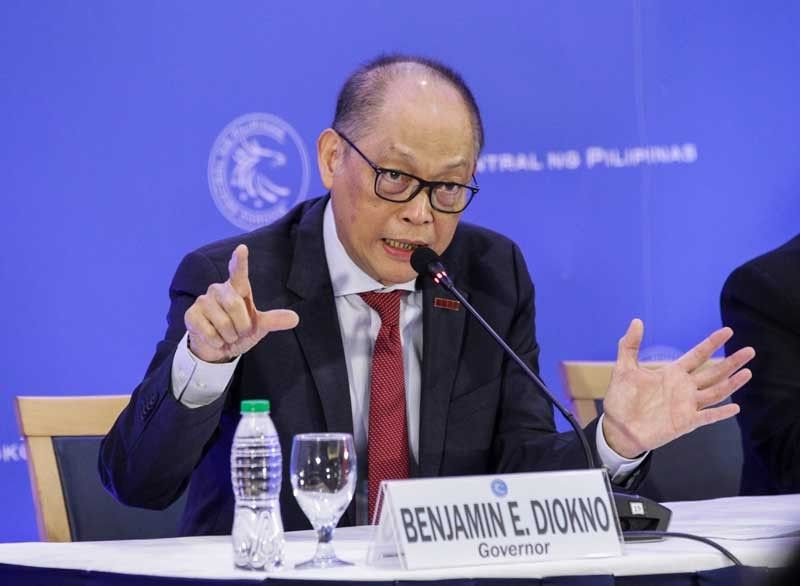BSP raises rates for the first time in over 3 years to fight inflation

MANILA, Philippines — The Bangko Sentral ng Pilipinas on Thursday hiked its policy rate for the first time in over three years, taking their first major action to fight an accelerating inflation that, if uncontrolled, could spoil the economy’s recovery from the pandemic.
At its meeting, the powerful Monetary Board decided to lift the key rate by 25 basis points to 2.25%. The rates on the overnight deposit and lending facilities were likewise raised to 2% and 3%, respectively.
By increasing borrowing costs, the BSP wants to temper consumer demand to tame sharp price spikes. The last time the BSP lifted the key rate was in 2018, when inflation hit a near-decade high amid a rice supply shortage and weak peso at the time.
Speaking to reporters, BSP Governor Benjamin Diokno said monetary authorities believe the economy is now strong enough to sustain its recovery with less help from the central bank. Gross domestic product grew 8.3% year-on-year in the first quarter, smashing expectations despite the Omicron onslaught at the start of the year.
"The Monetary Board noted that the strong rebound in domestic economic activity and labor market conditions during the first quarter of 2022 provides scope for the BSP to continue rolling back its pandemic-induced interventions, consistent with its exit strategy from monetary accommodation," Diokno said.
When the pandemic hit home in 2020, the BSP under Diokno embarked on an aggressive easing cycle that brought the policy rate to a historic-low of 2% in a desperate bid to save the economy.
But times have changed since the economy’s record meltdown two years ago and the pressure to hike has built for the BSP.
Earlier this year, central banks in advanced economies like the US Federal Reserve had started their liftoff amid a rising global inflation that is believed to be both a byproduct of the pandemic and a result of the ongoing war in Europe. The global tightening is spurring capital flight from emerging markets like the Philippines, and a rate increase is needed to stem the outflows by making local yields competitive.
At home, inflation quickened to 4.9% in April, the briskest pace in three years. The latest reading settled above the central bank’s 2-4% target and some economists fear that an unabated price growth may derail economic recovery by crippling consumer spending anew.
For the most part, the BSP is wary that inflation could average of 5% by the second quarter.
"Given these considerations, the Monetary Board believes that a timely increase in the BSP’s policy interest rate will help arrest further second-round effects and temper the buildup in inflation expectations," Diokno said.
The hard part
Apart from the rate hike, the BSP said it has also started reducing its government bond holdings as part of its “exit strategy”. At the height of the health crisis, Diokno said the central bank bought “more than 40%” of total government securities during a daily one-hour buying window meant to support the economy.
Diokno said the BSP now holds “less than 3%” of total government bonds, adding that the central bank would “recalibrate” its bond purchasing window to manage domestic liquidity.
“I’m guessing the BSP will not have the (government bond-buying) window open as often. So market will not always have a willing buyer for securities,” Nicholas Mapa, senior economist at ING Bank in Manila, said.
But the hard part is just starting for the BSP as monetary authorities would need to make sure that the rate hikes are just enough to slow the economy to allow high prices to cool down without throwing the Philippines to recession again. According to Diokno, the magnitude of future rate hikes would remain “data dependent”.
“The BSP’s tightening cycle is unlikely to be long, with the policy rate likely to settle lower than its pre-pandemic level of 4.00%,” Alex Holmes, Asia economist at Capital Economics, said.
- Latest
- Trending































